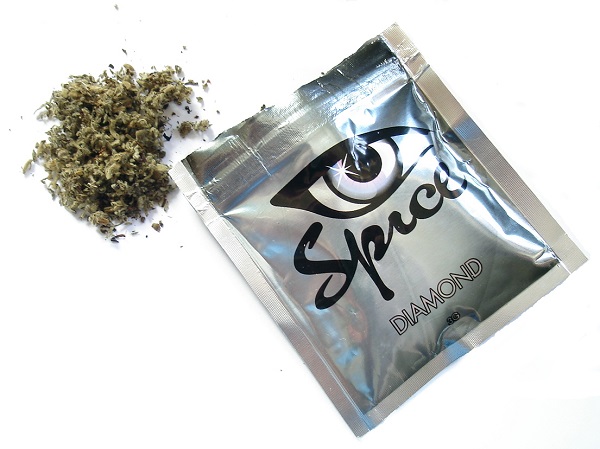As society’s understanding and acceptance of cannabis evolves, so does the scientific exploration of its chemical constituents. Tetrahydrocannabinol, commonly known as THC, is the primary psychoactive compound found in cannabis that has captivated researchers and enthusiasts alike. Traditionally sourced from the marijuana plant, THC has been revered for its euphoric effects and therapeutic properties. However, recent advancements in the field of pharmaceuticals have led to the development of synthetic THC, a lab-created alternative.
In this article, we delve into the world of synthetic cannabinoids and the ethical considerations surrounding its use.
What are synthetic cannabinoids?

Synthetic cannabinoids, also known as synthetic cannabis, have emerged as a novel psychoactive substance (NPS) designed to replicate or induce similar effects as cannabis.
It is important to note that synthetic cannabinoids are not a synthetic rendition of cannabis and do not accurately replicate the effects of delta-9 tetrahydrocannabinol (THC), the active component in cannabis. In fact, they generate various adverse effects that are unrelated to cannabis consumption.
Consequently, referring to these substances as synthetic cannabis or synthetic marijuana is incorrect.
The appropriate term to describe these compounds is synthetic cannabinoid receptor agonists (SCRAs). Nevertheless, for the sake of simplicity, this article will employ the term synthetic cannabinoids.
Synthetic cannabinoids typically exist as powdered chemicals, which are often blended with solvents and then sprayed onto herbs. These products are subsequently sold in vibrant and branded packages. Notably, the chemical composition frequently varies between batches as manufacturers endeavor to evade legal restrictions. Hence, even if the packaging displays the same name and branding, different packets may yield diverse effects.
Various brand names are used to market synthetic cannabinoids, encompassing a range of products.
Among the first synthetic cannabinoid products to be introduced in numerous European countries was Spice. Subsequently, several similar products have been developed, including Kronic, Northern Lights, K2, and Kaos.
In addition to their traditional forms, synthetic cannabinoids can also be marketed and sold under different guises. They may be promoted as aphrodisiac tea, herbal incense, or potpourri, further expanding their availability and consumption options.
Smoking is the predominant method of consuming synthetic cannabinoids. This route of administration is most commonly chosen by users.
Upon inhalation, the effects of synthetic cannabinoids are typically experienced swiftly, usually within a matter of minutes. The rapid onset of these effects distinguishes them from other forms of consumption.
Effects of synthetic cannabinoids
Synthetic cannabinoids can have varied effects on individuals, as these effects are influenced by several factors. These factors include the person’s size, weight, and overall health status. Additionally, factors such as prior experience with synthetic cannabinoids, concurrent use of other drugs, the quantity consumed, the potency of the specific batch of the drug, and the environment in which it is consumed all contribute to the unique response experienced by each individual.
The effects of synthetic cannabinoids can encompass a wide range of outcomes. Some individuals may experience relaxation and euphoria, while others may encounter undesirable effects such as a loss of coordination, a rapid and irregular heartbeat, or racing thoughts. Psychological symptoms like agitation, anxiety, and paranoia can also arise. In severe cases, synthetic cannabinoids can induce psychosis, leading to distorted thinking and a detachment from reality. Furthermore, aggressive and violent behavior, chest pain, vomiting, high blood pressure (hypertension), breathing difficulties, hyperthermia (overheating), rhabdomyolysis (breakdown of muscle tissue), acute kidney injury, seizures, stroke, and, tragically, even death are all potential consequences of synthetic cannabinoid use.
Given the unpredictability and potential risks associated with synthetic cannabinoids, it is crucial to prioritize one’s well-being and make informed decisions regarding substance use.
Set and Setting

The effects of synthetic cannabinoids can vary based on an individual’s mood, commonly referred to as the “set,” as well as the environment in which they consume the substance, known as the “setting.”
The set refers to a person’s state of mind, previous experiences with psychoactive drugs, and their expectations of the drug’s effects. For instance, if someone is already experiencing feelings of stress or anxiety prior to using synthetic cannabinoids, these emotions may be intensified, leading to an unpleasant experience.
On the other hand, the setting encompasses the physical and social environment in which synthetic cannabinoids are consumed. Factors such as familiarity with the surroundings, the presence of trusted individuals, the indoor or outdoor location, as well as the type of music and lighting can influence the overall experience. Using synthetic cannabinoids in a calm, quiet, and relaxed environment is more likely to result in a positive experience, whereas being in a noisy, crowded place may contribute to a negative experience.
It is crucial to note that consuming a large quantity of synthetic cannabinoids or using a potent batch can lead to an overdose. If any of the following symptoms are present, it is essential to immediately call for an ambulance:
- Fast or irregular heart rate
- Chest pain
- Breathing difficulties
- Severe hyperthermia (high body temperature)
- Delusional behavior
Prolonged and regular use of synthetic cannabinoids can lead to various long-term effects, including mental health disorders, cardiovascular problems, and behavioral and cognitive impairments. It is crucial to be aware of these potential consequences.
Synthetic cannabinoids have a particularly detrimental impact on mental health. Individuals with pre-existing mental health conditions or a family history of such conditions should avoid using these substances. Those who do use synthetic cannabinoids are at a higher risk of experiencing symptoms of anxiety and depression. Furthermore, long-term use of synthetic cannabinoids is strongly associated with the development of serious mental health disorders.
Psychosis, a severe mental condition characterized by a loss of touch with reality, can occur in both individuals with sound mental health and those who are already vulnerable. However, the psychotic symptoms induced by synthetic cannabinoids are more intense and can persist for weeks even after discontinuing use. In comparison to cannabis, synthetic cannabinoids are more likely to cause severe and prolonged psychotic experiences.
Additionally, regular users of synthetic cannabinoids can develop tolerance to the drug, leading to a decreased response to the same dosage. This often leads to individuals increasing their intake of synthetic cannabinoids to achieve the desired effect. Dependence can also develop, where individuals feel reliant on synthetic cannabinoids to carry out daily activities such as work, study, socializing, or simply getting through the day.
Understanding the potential for long-term effects, tolerance, and dependence is crucial when considering the use of synthetic cannabinoids. Seeking professional help and support is strongly encouraged for individuals facing these challenges.
Mixing synthetic cannabinoids with other drugs
Combining synthetic cannabinoids with other drugs, whether they are over-the-counter medications or prescribed drugs, can lead to unpredictable and hazardous effects.
Mixing synthetic cannabinoids with antidepressant medications, such as selective serotonin reuptake inhibitors (SSRIs), is extremely dangerous. This combination can result in fever, rapid heartbeat, seizures, organ failure, coma, and even death.
When synthetic cannabinoids are used alongside stimulants like crystal methamphetamine (ice) or cocaine, the effects can be particularly hazardous, increasing the likelihood of experiencing anxiety and other adverse reactions.
Polydrug use, which involves the simultaneous consumption of multiple drugs or different types of drugs, carries additional risks and complications.
For individuals who have been using synthetic cannabinoids heavily and regularly, discontinuing use can be challenging. Withdrawal symptoms may be experienced when attempting to quit, including insomnia, nausea, vomiting, loss of appetite, paranoia, panic attacks, agitation, irritability, anxiety, mood swings, and rapid heartbeat.
To minimize the risks of tolerance and dependence on synthetic cannabinoids, it is recommended to take regular breaks from smoking the drug and avoid consuming large amounts at once.
Being mindful of the potential dangers of combining substances, understanding withdrawal symptoms, and seeking support to overcome dependence are crucial steps in promoting a healthier and safer lifestyle.
Health and safety
Using synthetic cannabinoids in any way is inherently unsafe. However, if an individual still chooses to use the drug, it is crucial to consider the following factors:
- Regulating intake:
Predicting the strength and effects of synthetic cannabinoids is challenging since potency can vary significantly between batches. Even if someone has used it before, the effects may still differ.
Starting with a very small dose can help gauge the potency and potential effects. Dose size should be increased gradually, allowing sufficient time for the previous dose to wear off.
Using synthetic cannabinoids without mixing them with substances like tobacco or dried parsley is essential. Inhaling the drug through bongs or pipes can increase the risk of overdose or adverse reactions.
- Misleading packaging:
The packaging of synthetic cannabinoids can be deceptive. While they may be labeled as “herbal,” the actual psychoactive substance is synthetic.
The accurate listing of ingredients and their quantities may not be provided, increasing the risk of overdose.
Chemical compositions tend to vary between different batches, meaning that even if the packaging looks the same, different packets can produce different effects.
- Instances where use should be strictly avoided:
Using synthetic cannabinoids in combination with alcohol or other drugs, particularly stimulants like crystal methamphetamine (known as ‘ice’) or MDMA, significantly heightens the risks.
Operating a vehicle or heavy machinery while under the influence of synthetic cannabinoids is extremely dangerous.
Avoiding use when tasks requiring judgment or motor coordination are necessary.
Using the drug alone should be avoided to ensure immediate medical assistance is accessible if needed.
Individuals with mental health conditions or pre-existing heart problems are at greater risk and should abstain from using synthetic cannabinoids.
Summary
Synthetic THC, or synthetic cannabinoids, should be approached with extreme caution due to their unpredictable and potentially dangerous effects. There is no safe level of use, and long-term use can lead to various mental and physical health complications. Combining synthetic THC with other drugs further increases the risks. It is crucial to prioritize personal safety and well-being by avoiding the use of synthetic THC altogether. Seeking professional help and support is strongly recommended for individuals struggling with synthetic THC use or dependence.












